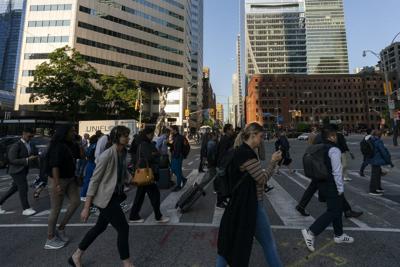It’s happening: The trains are overcrowded again. There’s traffic gridlock every weekday morning. There are longer lines at your favourite downtown coffee shop and even longer queues at lunch hour.
The pre-pandemic norm of working five days in the office is coming back for many Canadians, except it’s not exactly the same this time around. The cost of just about everything, from food to gas, has risen significantly from five years ago. But for many office-goers, their paycheques haven’t kept pace.
For those mandated to return to the office, they face increased expenses for transit, parking, meals and even dog-walkers as they prepare to spend more time away from home.
Financial educator Eduek Brooks estimates the cost of returning to the office five days a week could range anywhere between $800 and $1,000 per month. Her calculation includes driving to work, paying for parking and eating out a few times a week as well as additional costs such as buying new clothing and beauty products.Â
“You’re so used to not having those costs and now going back and doing those things ... There might be that big shock people will see in the first few weeks or even months of going back to work,” Brooks said.
Experts say this may be a time to search for some financial wiggle room for back-to-office expenses.
Caval Olson-Lepage, certified financial planner at Innovation Wealth, said it’s about taking your budget back to the basics of wants versus needs.
“It’s really an awareness of what you’re spending that money on, and is it a need that you have to absolutely spend it?” she said.
For example, instead of buying a coffee every morning, getting it just once a week can help divert upwards of $30 into your commuting budget, she said.
Olson-Lepage recalled how she diverted some of the money she would normally spend on commuting to buying more books during the pandemic.
“Now that I’m going back to work, it’s like, well, as much as I love my books ... I need that money now to go back to spending on gas,” she said.
Sara McCullough said there’s an assumption that working from home was automatically saving people money.
“Are we? Did you get yourself an extra subscription because you weren’t commuting?” asked McCullough, a certified financial planner and founder of WD Development.
McCullough said people need to be realistic about how their spending habits have shifted over the years.Â
She also said people should consider options for increasing their income, such as negotiating a raise or switching to a higher-paying job to offset growing return-to-work expenses. Â
McCullough said going back to the office today “isn’t going to be like it was pre-pandemic because you’re not who you were pre-pandemic.”
That means people may have different needs and priorities than they did five years ago.
Olson-Lepage said managing in-office days without upending your household budget takes dedication and discipline.
“If you can plan that time on a Sunday before the work week to prep all of your lunches, then it’s done,” she said. “You don’t have to think about it during the week when you’re more likely to be tired.”
Olson-Lepage said return-to-office is going to be a balancing act for many people as they get used to being outside of the home again.
“It’s definitely not easy, and there is no ... one-size-fits-all formula, but it’s about really just being aware of your situation,” she said.
Brooks suggested people buy snacks in bulk and keep them at their desk to avoid spending money when a snack craving hits.
“You’re not tempted to go to the cafeteria or the vending machine or go out for a coffee midday because you have something that you can snack on,” she said.Â
However, despite your best efforts to minimize expenses associated with returning to the office, Brooks said people might not be able to save as much as they did while working from home.
“The reality of the matter is that people might not be able to save for the first six months to a year of going back to the office while they’re making these adjustments, especially if you had such a major lifestyle change,” she said.Â
But as time goes on, she said it will be easier to get a sense of where the savings can happen.
This report by The Canadian Press was first published Sept. 18, 2025.


























To join the conversation set a first and last name in your user profile.
Sign in or register for free to join the Conversation